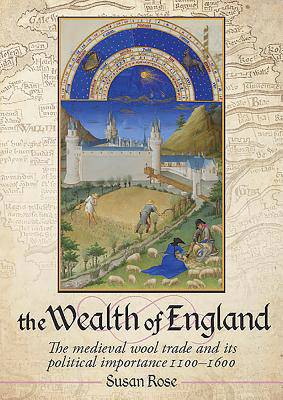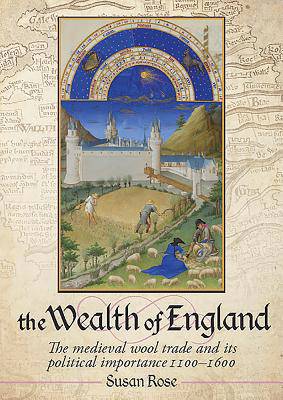
Je cadeautjes zeker op tijd in huis hebben voor de feestdagen? Kom langs in onze winkels en vind het perfecte geschenk!
- Afhalen na 1 uur in een winkel met voorraad
- Gratis thuislevering in België vanaf € 30
- Ruim aanbod met 7 miljoen producten
Je cadeautjes zeker op tijd in huis hebben voor de feestdagen? Kom langs in onze winkels en vind het perfecte geschenk!
- Afhalen na 1 uur in een winkel met voorraad
- Gratis thuislevering in België vanaf € 30
- Ruim aanbod met 7 miljoen producten
Zoeken
The Wealth of England
The Medieval Wool Trade and Its Political Importance 1100-1600
Susan Rose
Hardcover | Engels
€ 66,95
+ 133 punten
Omschrijving
The wool trade was undoubtedly one of the most important elements of the British economy throughout the medieval period - even the seat occupied by the speaker of the House of lords rests on a woolsack. In The Wealth of England Susan Rose brings together the social, economic and political strands in the development of the wool trade and show how and why it became so important. The author looks at the lives of prominent wool-men; gentry who based their wealth on producing this commodity like the Stonors in the Chilterns, canny middlemen who rose to prominence in the City of London like Nicholas Brembre and Richard (Dick) Whittington, and men who acquired wealth and influence like William de la Pole of Hull. She examines how the wealth made by these and other wool-men transformed the appearance of the leading centres of the trade with magnificent churches and other buildings. The export of wool also gave England links with Italian trading cities at the very time that the Renaissance was transforming cultural life. The complex operation of the trade is also explained with the role of the Staple at Calais to the fore leading to a discussion on the way the policy of English kings, especially in the fourteenth century, was heavily influenced by trade in this one commodity. No other book has treated this subject holistically with its influence on the course of English history made plain.
Specificaties
Betrokkenen
- Auteur(s):
- Uitgeverij:
Inhoud
- Aantal bladzijden:
- 240
- Taal:
- Engels
Eigenschappen
- Productcode (EAN):
- 9781785707360
- Verschijningsdatum:
- 28/02/2018
- Uitvoering:
- Hardcover
- Formaat:
- Genaaid
- Afmetingen:
- 170 mm x 244 mm
- Gewicht:
- 771 g

Alleen bij Standaard Boekhandel
+ 133 punten op je klantenkaart van Standaard Boekhandel
Beoordelingen
We publiceren alleen reviews die voldoen aan de voorwaarden voor reviews. Bekijk onze voorwaarden voor reviews.









